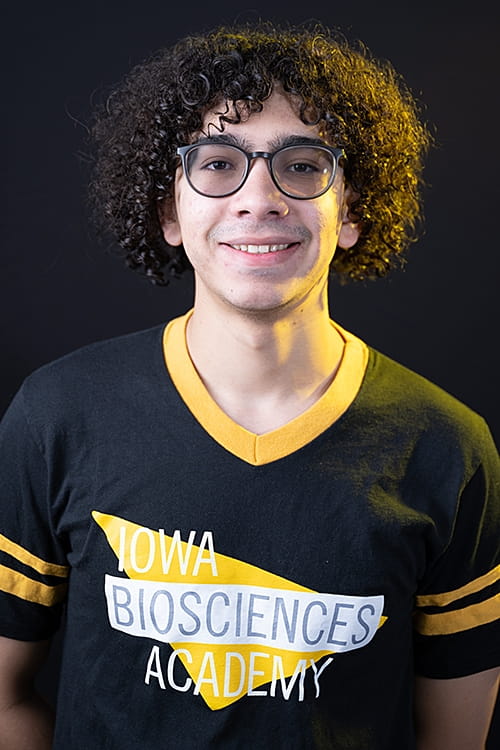
Héctor O. Sánchez Meléndez, Undergraduate student, neuroscience
Studies word recognition in bilinguals
“Héctor is a first-gen Hispanic student who came to the UI to study medicine. He found that he did not enjoy what he was doing. He began looking into research and found Dr. Hendrickson’s lab. He has greatly enjoyed what he is doing, saying that he feels a unique connection to his project, and is now preparing to apply for graduate school.” -Melinda Licht, program coordinator, Iowa Center for Research by Undergraduates
Hometown: Bayamón, Puerto Rico
Faculty mentor/advisor: Kristi Hendrickson, PhD, assistant professor of communication sciences and disorders, College of Liberal Arts and Sciences
What is your degree program and expected graduate date? BS neuroscience, spring 2023
Please describe your research: My research tries to understand how different groups of people recognize and process words or sentences. Some of our recent work has been trying to understand if bilinguals, across their lifetime, activate words from their second language when hearing or reading their first language, and vice versa. I am also interested in understanding surprisal and inhibitory mechanisms in language. My future research is focusing on understanding how the cognitive process of inhibition is an important aspect of language.
In simple terms, why does this research matter? Historically, bilinguals have been a growing community worldwide that has been underrepresented in research. Further understanding how bilinguals process language and how this might differ from monolinguals helps better inform speech language pathologists in their clinical practice. Furthermore, we hypothesize that inhibition or the lack thereof is a component to developmental language disorder, a condition characterized with difficulty of understanding and using language. Although common, the exact mechanisms by which this disorder causes language difficulties is unknown, so our research aims to fill this gap.
How soon after starting at the University of Iowa were you able to participate in research? I got involved in research the summer leading up to my junior year. That was a little over a year after COVID-19 started and it was the summer when “zoom university” finally ended. The university opened the doors for classes to be in person again and I was very excited to go back, after months of doing nothing because of quarantine. I received emails from the Iowa Biosciences Academy on how I could get funding to work in a lab, take seminars, and become part of a community of undergraduate researchers. I reached out and, not much later, I joined the Psycholinguistics Lab under Dr. Kristi Hendrickson as a research assistant.
How has being involved in research made you more successful at the University of Iowa? It is the most rewarding experience I have had in my college career. I have had the opportunity to become part of a research group, in which my ideas have become the spearhead for developing projects. As an upcoming senior and experienced research assistant, I can present experiments I have been working on for the past months in local and national conferences and participate in writing up the results.
What are your career goals and/or plans after graduation? My time as a research assistant has prepared and motivated me to pursue graduate school in, most likely, cognitive neuroscience. I am very excited for some of the projects we are starting right now in the lab, and I am inclined to keep working on these projects after graduation. Ultimately, I plan to get a PhD and move back to Puerto Rico where I want to establish my own lab.
Read more about Héctor: Learning to decode the brain
Banner location: not on display—
